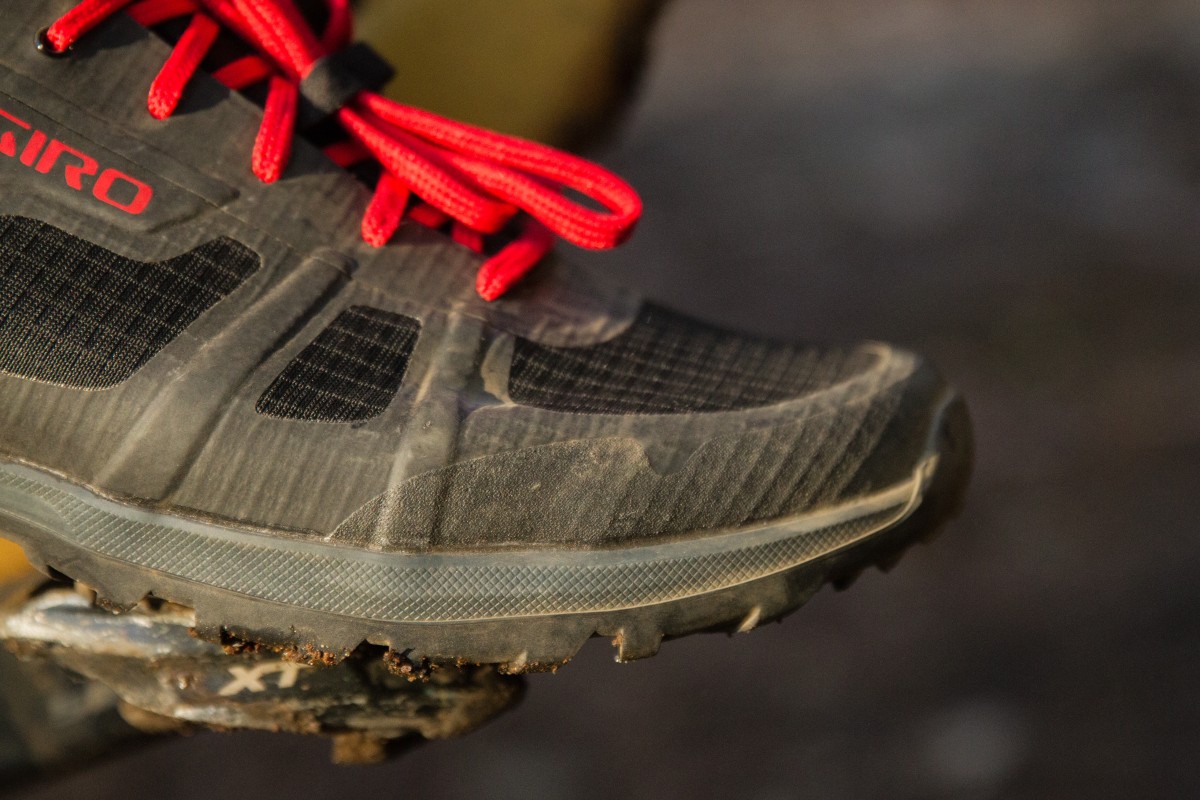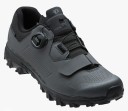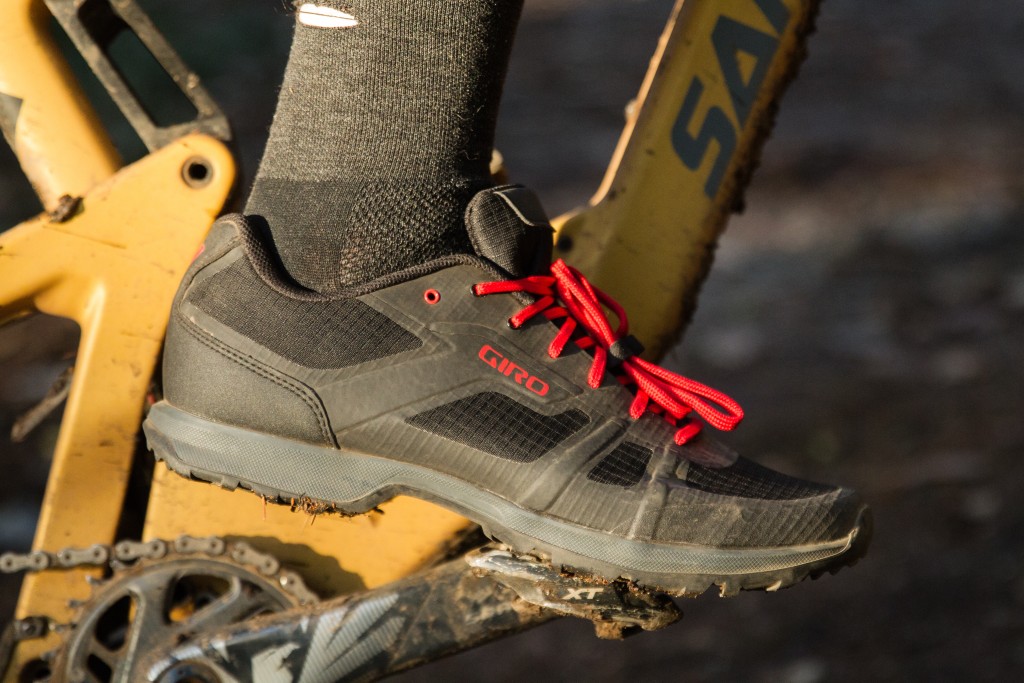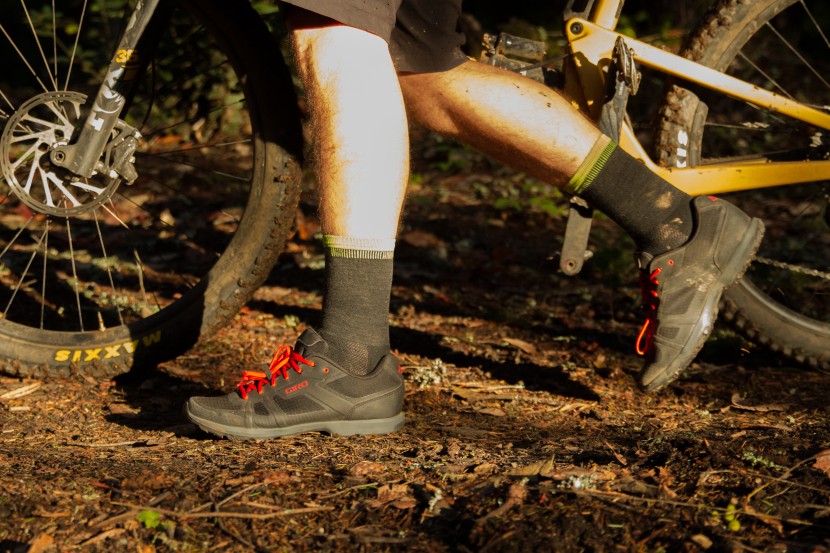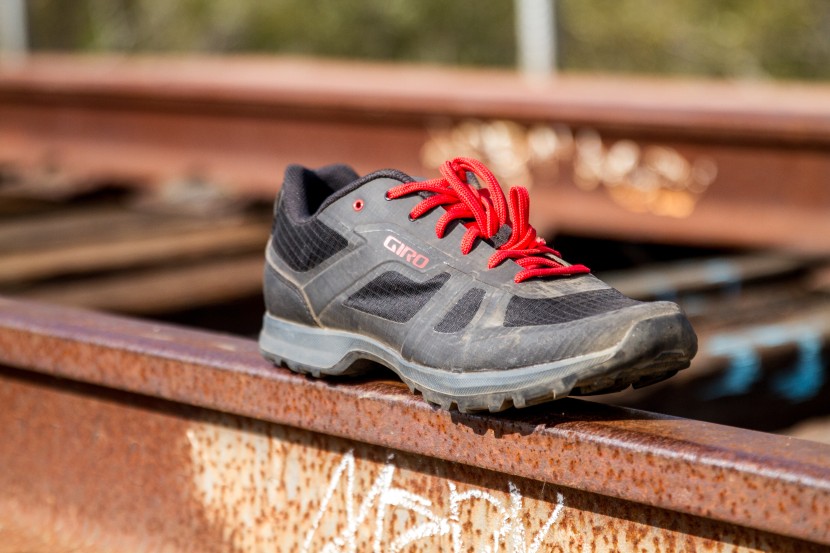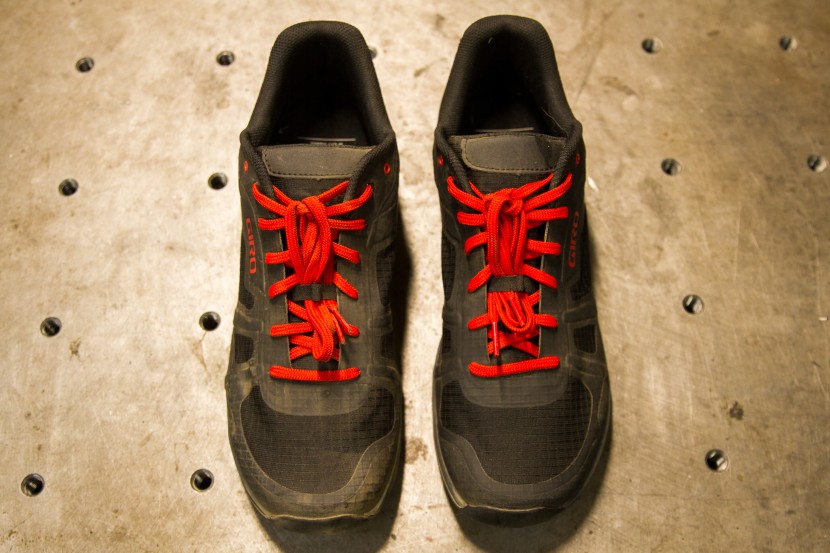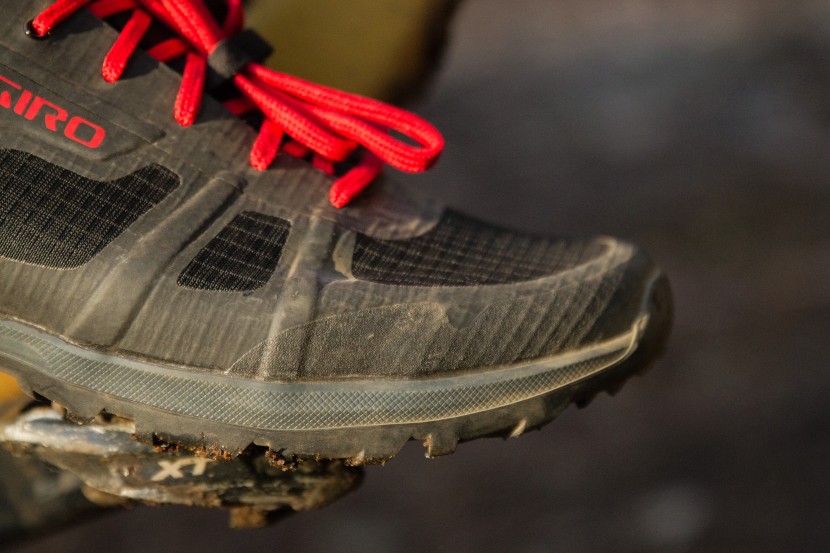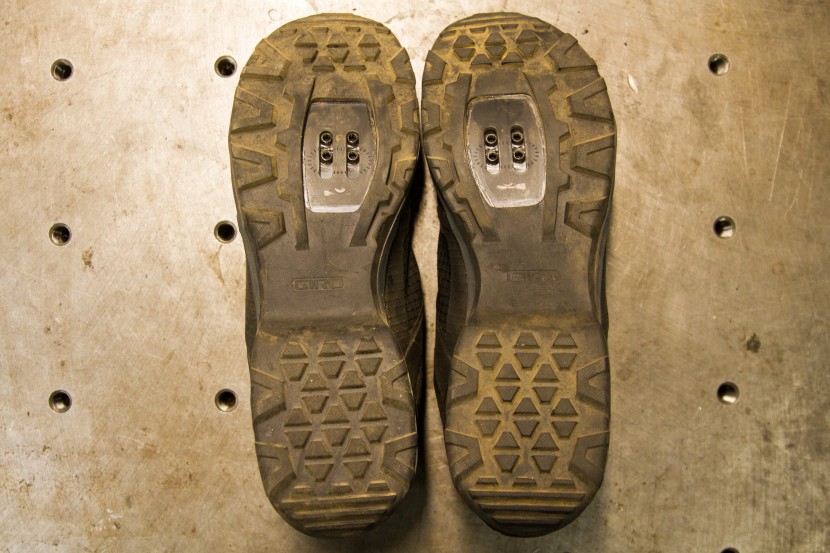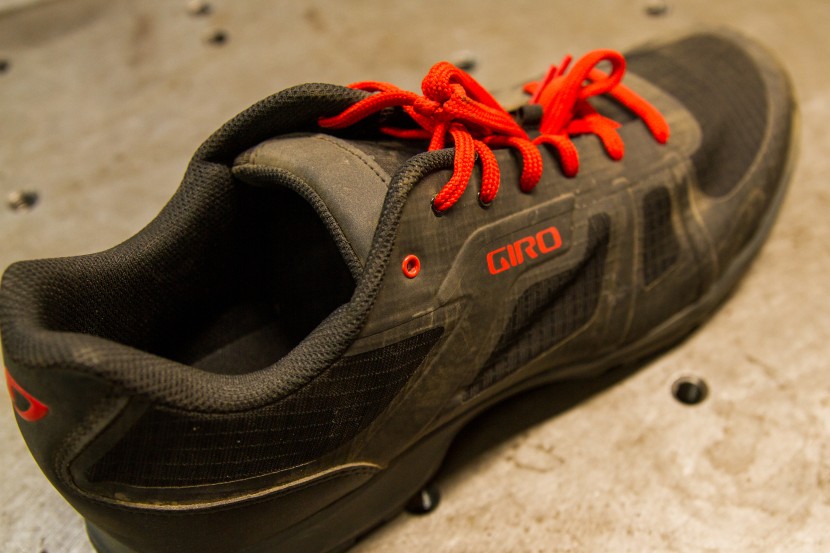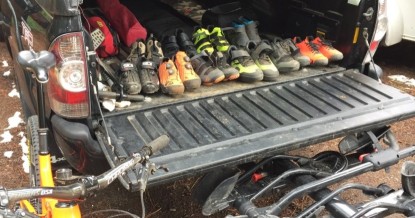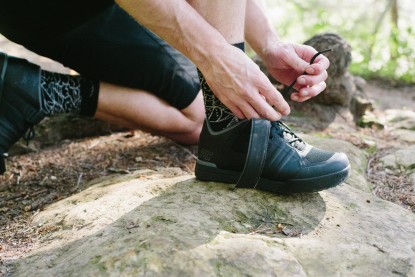Giro Gauge Review
Our Verdict
Compare to Similar Products
 This Product
Giro Gauge | |||||
|---|---|---|---|---|---|
| Awards | Best on a Tight Budget | Best for Foot Protection and Durability | Best for Adventure Riding | Best Bang for the Buck Cross Country Shoe | Best Bang for Your Buck All-Mountain/Trail Shoe |
| Price | $89.95 at Backcountry Compare at 2 sellers | $180 List $144.00 at Backcountry | $150.00 at REI Compare at 2 sellers | $170 List | $130 List Check Price at Backcountry |
Overall Score  |
|||||
| Star Rating | |||||
| Bottom Line | These shoes offer a good blend of on and off-the-bike performance for casual trail riding or bikepacking | This shoe offers a burly construction and a walkable, grippy sole | Fantastic shoes for adventurous rides and bikepacking thanks to moderate sole stiffness and great walkability/traction | An XC/trail riding shoe that combines high performance with affordability | Lightweight with good power transfer and walkability, these are a reasonably priced trail riding shoe with casual styling |
| Rating Categories | Giro Gauge | Ride Concepts Talla... | Pearl Izumi X-Alp S... | Scott MTB Team Boa | Specialized 2FO Roo... |
| Comfort (25%) | |||||
| Traction and Walkability (25%) | |||||
| Power Transfer (20%) | |||||
| Weight (15%) | |||||
| Durability (15%) | |||||
| Specifications | Giro Gauge | Ride Concepts Talla... | Pearl Izumi X-Alp S... | Scott MTB Team Boa | Specialized 2FO Roo... |
| Measured Weight (per shoe) | 452 grams | 539 grams | 435 grams | 359 grams | 375 grams |
| Closure | Laces | Laces plus Velcro strap | Boa L6 dial | Boa iP-1 dial, plus Velcro strap | Laces |
| Outsole | Rubber outsole | Clip Grip | Vibram ECOSTEP | StickiRubber | SlipNot FG |
| Upper Material | Synchwire on-piece composite | Bonded Cordura mech with TPU toe and heel protection | Seamless perforated synthic upper | Synthetic Polyurethane, 3D Airmesh | Synthetic Leather and Textile |
| Footbed | Die-cut EVA | D30 High Impact Insole | EVA heel support | ErgoLogic | Specialized Body Geometry |
| Midsole | Injected nylon shank | RC Powerdrive Nylon Shank | EVA heel cushioning | Nylon/Glass Fiber Composite | Stiff Lollipop nylon composite plate |
| Size Tested | 45 | 11 | 46 | 44 | 43.5 |
| Width Options | Regular | Regular | Regular | Regular | Regular |
Our Analysis and Test Results
Giro has a long history of designing high-quality footwear, so we put our trust in them and ordered up a pair of Giro Gauge shoes to run through our testing gauntlet. We were a bit skeptical of the design at first. If you crossed a pair of mountain biking shoes with a pair of trail running shoes, you would probably end up with something that looks a lot like this model, and we weren't sure if it was entirely possible to design a decent athletically-inspired mountain bike shoe that performs both on and off the bike. After a few weeks of testing, we came to appreciate the niche that the Gauge fills. We think that this is one of the best values on the market.
Comfort
With its athletic-inspired fit and feel, the Gauge is a comfortable pair of shoes. Putting them on for the first time doesn't feel quite as cushy as a fresh pair of running shoes, but fit-wise they're not far off. The fit sits slightly towards the narrow side of neutral with a slightly longer toe box than we're used to. Regardless, our wide-footed lead tester was able to find a comfortable fit with some minor fiddling with the laces. The thin upper conforms well to the top of the foot, and the laces allow for all the adjustment across the top of your instep that you might need. Like most mountain bike shoes, the insole is quite a bit less supportive and cushioned than a typical athletic shoe, which contributes to a more crisp power transfer. The footbed has just enough cushion to feel comfortable when you're on your feet, though, and the insole packs in and forms to your foot as you break in the shoes.
The Gauge offers a fairly limited range of cleat adjustment when compared to other shoes that we tested. Most shoes today offer a wide cleat box with long mounting tracks that allow riders to move cleats fore and aft to their preference. The Guage cleat box is wide, but the mounting tracks are short and located just behind the ball of the foot. For gravity applications, we would prefer to mount cleats further rearward than the Gauge allows, but for trail and cross-country riding we were satisfied with the mounting options. Nonetheless, we dinged this model's comfort score slightly for its limited cleat adjustability.
Traction and Walkability
When it comes time to step off the bike and navigate an unrideable trail feature the Gauge is one of the best shoes we tested, and it received a perfect score in this metric. The half-length nylon shank allows the sole to flex slightly in front of the cleat box at the toes and considerably at the heel. As a result, you can walk both uphill and downhill with a natural gait that doesn't cause excessive calf fatigue or foot pain like a traditional stiff-soled mountain bike shoe. The cleat box is recessed enough that the cleat doesn't scrape on the ground with every step, and it's only in uneven rocky terrain that you notice the cleat underfoot.
The thin, pliable upper and aggressively lugged outsole add to this shoe's off-the-bike performance. Unlike most aggressive trail or performance cross-country shoes, the Gauge's upper mimics a running shoe and allows the shoe to react and conform to the terrain more. We noticed that this model doesn't feel like it's as hard on your feet when walking over rough terrain as many of the stiffer models we tested. The aggressive tread provides great grip on steep terrain. We tried out our test model in both dust and mud, and the outsole reliably kept us from falling on our faces when hiking steep sections of trail.
Power Transfer
When we read about the athletic-inspired design and laid eyes on the thin, mesh-heavy upper we had nightmares that the Gauge might just fold in half the moment we stepped on the pedals, but we were pleasantly surprised with the power transfer out on the trails. The sole is flexible but not as floppy as your typical sneaker or running shoe, and it packs an injected-nylon inner shank beneath the cleat box that's just stout enough to hold up under power. For our first few rides with these shoes, we took out a single-speed hardtail on some aggressive cross-country trails to see how they held up in a worst-case scenario. While we certainly felt some flex in the sole, it wasn't enough to cause foot fatigue or frustrate us on long climbs. The thin upper doesn't stretch like we worried it might, and when it came time to really push and pull on steep climbs it kept our feet firmly in place. On average rides, without high-intensity efforts or steep climbs, you might not even notice that the soles are a bit more flexible than your average trail shoe. The Gauge wouldn't be our first choice if we were hunting for PRs on the climbs, but the pedaling platform is far from the worst we've tested.
We tested our pair of Guage shoes with SPD cleats and Shimano XT trail pedals. The XT trail pedals have a small extended platform that helps add a little bit of extra support while pedaling and descending. It's possible that the sole might feel slightly more flexible with a standard SPD pedal without the extended platform. Since we used XT trail pedals for all of the shoes we tested, however, we feel very comfortable with our rating and feel for this shoe's stiffness in comparison with the other models we tested.
Weight
Our size 45 pair of test shoes weighed in at 452-grams per shoe without any cleats installed, which settles them roughly in the middle of our test field. For a shoe with athletic styling, a thin upper, and a simple lace closure system we expected a slightly lower weight. Given that they pedal well and include a beefy lugged outsole, though, we're willing to accept a few extra grams, and we would be lying if we said we noticed it out on the trail.
Durability
After a month of testing and countless miles on the bike, our Giro Gauge test shoes show no signs of giving up the ghost. The reinforced toe and heel sections proved valuable in both protecting our feet from minor trailside obstacles and keeping the main body of the shoe free of damage. The mesh upper doesn't show any fraying or scuffing despite the fact that we treated these shoes just as harshly as any of the heavy-duty gravity shoes we tested.
With that said, we would be remiss if we didn't mention our durability concerns with this shoe. While it's well constructed, mesh-heavy uppers are prone to wear and tear over time. Over the long run, we could easily see repeated brushes with rocks or even the repeated pedaling motion slowly wearing out and tearing the upper as we commonly see with trail running shoes.
Should You Buy The Giro Gauge?
With one of the lowest price tags in the test and a well-rounded performance that surprised us, we think the Gauge is an incredible value. This shoe performed well enough to suit just about anyone, with the exception of aggressive gravity riders or performance-driven cross-country racers. The lack of substantial foot protection and the compromise between walkability and power transfer means that this shoe isn't ideal for either of the extremes, but for casual trail riders, backpackers, commuters, or anyone else just looking to enjoy their time on the bike, though, these shoes would be a great buy. Giro also makes the Gauge Boa that employs a Boa dial instead of laces for the closure for a slight increase in price.
What Other Mountain Bike Shoes Should You Consider?
Initially, we had our doubts about Giro's Gauge, but once we got them out on the trail we quickly realized the value of a shoe that can hold its own both on and off the bike. However, if you are looking to squeeze every last drop of performance out of your ride and don't plan to spend much time on foot, then the Shimano ME7 may better suit your preferences.


